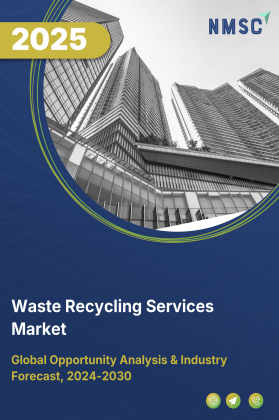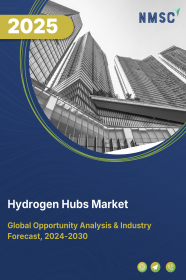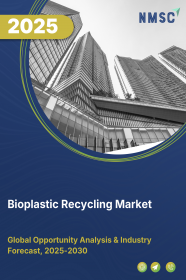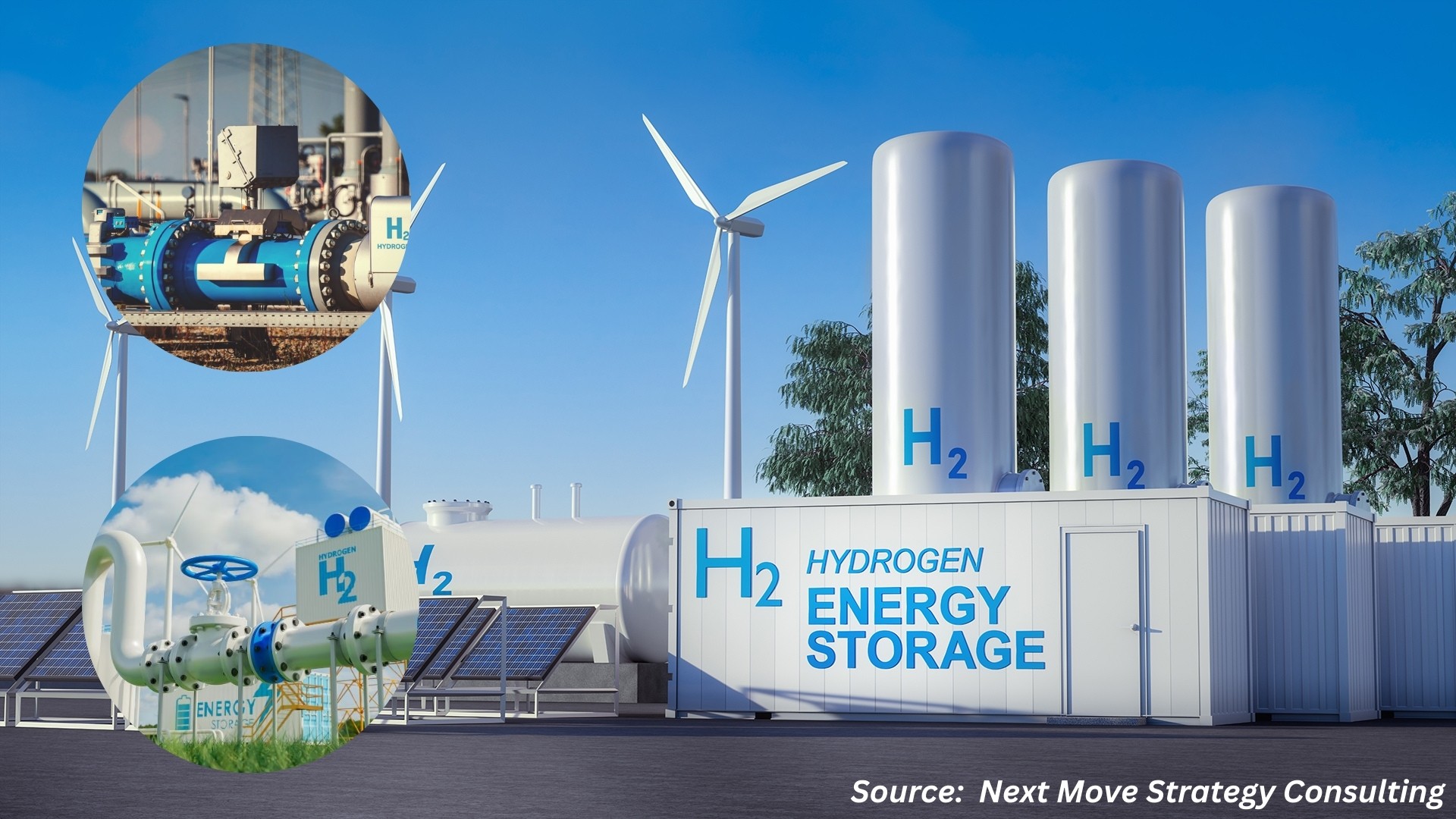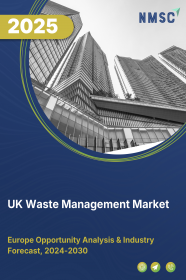
The UK Waste Management Market by Waste Type {Hazardous Waste (Solid Waste, Liquid Waste, Gaseous Waste), and Non-Hazardous Waste (Food, Paper and Cardboard, Plastic, Glass, Metal, Water, E-Waste, and Others)}, by Service {Collection (Collection and Transportation, Storage and Handling, Sorting), and Disposal (Open Dumping, Landfills, Recycling, and Others)}, by Source (Residential or Municipal Waste, Commercial Waste, and Industrial Waste) – Opportunity Analysis and Industry Forecast, 2024–2030
Industry: Energy & Power | Publish Date: 16-Oct-2025 | No of Pages: 206 | No. of Tables: 166 | No. of Figures: 111 | Format: PDF | Report Code : EP1245
The UK Waste Management Market Overview
The UK Waste Management Market size was valued at USD 8.32 billion in 2023, and is predicted to reach USD 12.50 billion by 2030, at a CAGR of 4.90% from 2024 to 2030.
The UK waste management market involves a wide range of services and activities aimed at managing and mitigating the impact of waste generated by various sectors including residential, commercial, industrial, and healthcare. It includes the collection, transportation, processing, recycling, and disposal of waste materials in a manner that is environmentally responsible and sustainable. The market also involves the development and implementation of technologies and practices that promote waste reduction, resource recovery, and the safe handling of hazardous materials.
Key components of the waste reduction market include waste collection services, recycling facilities, waste-to-energy plants, landfill operations, and environmental consulting services. As awareness of environmental issues grows, the waste reduction market continues to expand, driven by growing population, technological advancements, and increasing public demand for sustainable waste solutions.
Mandatory EPR Regulations for C&D Waste Stimulate Deployment of Recovery Infrastructure
The UK’s new Construction & Demolition (C&D) Waste Management regulations introduce enforceable Extended Producer Responsibility mandates for major building projects. Producers must register and report via a centralized portal, shifting accountability for waste handling from local councils to developers. This policy shift is prompting significant investment in on-site and centralized infrastructure—such as mobile crushers, material recovery facilities, and sorting plants—supporting the emergence of circular construction practices and expanding demand for advanced C&D waste technologies.
Smart City Initiatives Accelerate IOT and AI-Enabled Waste Collection Systems
Smart city programs across the UK are integrating IoT and AI solutions into waste management operations. Sensor-equipped bins and GPS-monitored waste trucks enable real-time monitoring, which supports optimized collection routes, reduced emissions, and enhanced recycling precision. Concurrently, AI-enhanced sorting systems are improving material recovery rates. These innovations are propelled by urban digitization strategies and circular economy goals, driving demand for intelligent waste infrastructure and private sector innovation.
Inconsistent Regulation and Spacial Limitations Hinder Infrastructure Rollout
Despite national policies aiming to modernize waste infrastructure, fragmented enforcement by regional authorities impedes consistent progress. Many local councils lack coordination or funding to implement national standards effectively. Moreover, land scarcity—especially due to green belt and urban planning restrictions—limits availability for new treatment facilities like MRFs or composting plants. These combined regulatory and spatial challenges continue to slow investment and limit scalability in the waste management sector.
Scalable Decentralized Waste Processing Models Offer a Transformative Path for Urban and Peri-Urban Areas
With urban density and growing waste volumes straining centralized systems, decentralized solutions are gaining traction. Modular systems—such as local composters, compact recycling units, and community-scale anaerobic digesters—provide flexible, low-footprint alternatives that reduce transport impact and foster local engagement. Supported by funding incentives and integration into strategic planning, these models are emerging as scalable, community-driven solutions that bolster resilience and inclusion in the UK’s circular economy transformation.
Competitive Landscape
The promising key players operating in the UK waste management industry includes Biffa Limited, Renewi Plc, Viridor Limited, FCC Environment, Mick George, DS Smith, Reconomy, Remondis UK Ltd., Veolia Environmental Services UK, Cory Group, Grundon Waste Management, Collect And Recycle, Simply Waste Solutions, Enva, Andrews Waste, and others.
The UK Waste Management Market Key Segments
By Waste Type
-
Hazardous Waste
-
Solid Waste
-
Liquid Waste
-
Gaseous Waste
-
-
Non-Hazardous Waste
-
Food
-
Paper and Cardboard
-
Plastic
-
Glass
-
Metal
-
Water
-
E-Waste
-
Others
-
By Service
-
Collection
-
Collection and Transportation
-
Storage and Handling
-
Sorting
-
-
Disposal
-
Open Dumping
-
Incineration/Combustion
-
Landfills
-
Recycling
-
Composting and Anaerobic Digestion
-
By Source
-
Residential or Municipal Waste
-
Commercial Waste
-
Offices and Retail Stores
-
Hospitals
-
Restaurants
-
Other Commercial Sources
-
-
Industrial Waste
-
Manufacturing Waste
-
Construction, Renovation, and Demolition Waste
-
Agriculture Waste
-
Medical Waste
-
Other Industrial Sources
-
Key Players
-
Biffa Limited
-
Renewi Plc
-
Viridor Limited
-
FCC Environment
-
Mick George
-
DS Smith
-
Reconomy
-
Remondis UK Ltd.
-
Veolia Environmental Services UK
-
Cory Group
-
Grundon Waste Management
-
Collect And Recycle
-
Simply Waste Solutions
-
Enva
-
Andrews Waste
Report Scope and Segmentation
|
Parameters |
Details |
|
Market Size Value in 2023 |
USD 8.32 billion |
|
Revenue Forecast in 2030 |
USD 12.50 billion |
|
Value Growth Rate |
CAGR of 4.90% from 2024 to 2030 |
|
Analysis Period |
2023–2030 |
|
Base Year Considered |
2023 |
|
Forecast Period |
2024–2030 |
|
Market Size Estimation |
Billion (USD) |
|
Growth Factors |
|
|
Companies Profiled |
15 |
|
Customization Scope |
Free customization (equivalent up to 80 working hours of analysts) after purchase. Addition or alteration to country, regional, and segment scope. |
|
Pricing and Purchase Options |
Avail customized purchase options to meet your exact research needs. |

















 Speak to Our Analyst
Speak to Our Analyst



